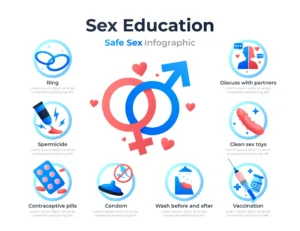Let’s be real—masturbation is one of the most common yet misunderstood parts of human sexuality. Nearly everyone has done it at some point in their lives, yet so many people still feel guilt, shame, or confusion about whether it’s “right” or “wrong.”
Is masturbation right or wrong? Explore 10 must-know facts backed by science and expert insights to understand the truth about self-pleasure.
The truth? Masturbation is normal, healthy, and deeply human. Touching yourself isn’t a sign of weakness—it’s a way of connecting with your own body, exploring what feels good, and embracing your natural sexuality.
Why Do So Many People Feel Guilty About Masturbation?
For centuries, society, religion, and cultural norms have labeled masturbation as “dirty” or “sinful.” Some people grow up being told never to touch themselves, others are shamed when caught experimenting as kids. That shame doesn’t magically disappear when we become adults—it often lingers, creating unnecessary anxiety around something as natural as breathing.
But here’s the reality: your body is built for pleasure. Just like hunger tells you when to eat, sexual desire is a biological signal that you’re alive, healthy, and human. There’s nothing inherently wrong about responding to that.
The Benefits of Masturbation
Far from being harmful, masturbation has proven mental and physical benefits:
- Stress relief – Orgasms release feel-good hormones that calm the body and mind.
- Better sleep – Masturbation can help you drift off naturally.
- Self-knowledge – It teaches you what turns you on, which is key for better partnered sex.
- Sexual confidence – When you know your body, you can guide a partner more easily.
- Safe pleasure – No risk of pregnancy, no risk of STIs—just you and your body.
Instead of being a source of shame, masturbation can be a path to self-love, healing, and empowerment.
When Does Masturbation Become a Problem?
Like anything, balance is important. Masturbation only becomes unhealthy if:
- It replaces real intimacy instead of complementing it.
- It’s used as the only escape from stress or loneliness.
- It starts to feel like an addiction that controls you rather than a choice.
The key question isn’t “Is masturbation wrong?” but rather:
👉 “Am I using this in a way that makes my life better—or am I letting it control me?”
For Singles and Couples
- Singles: Masturbation can be a safe way to explore your sexuality and release tension while waiting for the right partner. It doesn’t make you less desirable—it often makes you more confident.
- Couples: Masturbation doesn’t have to be a solo act. Many couples incorporate it into foreplay or long-distance intimacy. Watching your partner touch themselves, or sharing your self-pleasure together, can actually deepen intimacy.
10 New Sex Methods & Hottest Sex Positions with Toys for Couples
Why People like Sex Dildos: Exploring Preferences Across Relationships
Here’s a balanced and thoughtful blog-style overview, drawing from credible U.S. sources, that explores whether masturbation is “right or wrong.” It includes 10 key facts supported by scientific consensus, what voices in public discourse have said, and 10 reliable external sources you can link to in your blog.
10 Key Facts About Masturbation
- Masturbation is medically and psychologically normal and healthy
The American Medical Association recognized masturbation as a normal behavior back in 1972 (Wikipedia). - There are no physical harms from moderate masturbation
Myths like vision loss, infertility, or hair growth on palms are scientifically unfounded (Cleveland Clinic, Planned Parenthood, Psych Central, Verywell Health). - It offers real physical and mental health benefits
These include stress relief, mood improvement, better sleep, pain relief (e.g., menstrual cramps), and enhanced self-esteem (Planned Parenthood, Modern Intimacy, Glamour, Teen Vogue, Proactive For Her). - Helps with learning about sexual preferences and enhancing partnered sex
Exploring one’s body can improve self-knowledge and communication with partners (Planned Parenthood). - May reduce prostate cancer risk in men
Research indicates frequent ejaculation—including masturbation—correlates with lower prostate cancer risk (Modern Intimacy, Wikipedia). - Safe regarding STIs and pregnancy when done solo
Masturbation carries virtually no risk of sexually transmitted infections or pregnancy (Planned Parenthood). - Compulsive or excessive masturbation may cause issues
Excessive frequency or compulsive behavior may cause distress, interfere with daily life, or lead to physical irritation (Cleveland Clinic). - Proper hygiene is important
Washing hands or cleaning sex toys reduces the risk of infection or discomfort (Texas Tech University Departments). - Feelings of guilt are often culturally or religiously driven
Scientific consensus finds nothing inherently immoral about masturbation, though guilt persists in many cultural and religious contexts (Cleveland Clinic). - Sex-positive self-care can foster body positivity and empowerment
Embracing self-pleasure can challenge sex-negative norms, support positive sexual identity, and build confidence (Glamour).
What People and Thought Leaders Say
- Cleveland Clinic emphasizes that masturbation is a natural and healthy sexual behavior and debunks persistent myths like it causing vision loss or infertility (Cleveland Clinic).
- Planned Parenthood presents masturbation as the safest form of sexual expression and highlights its role in learning one’s body and relieving stress (Planned Parenthood).
- Psych Central reinforces that masturbation is not inherently harmful and normalizes it as a common behavior (Psych Central).
- Modern Intimacy explains the hormone benefits—endorphins, oxytocin, dopamine—and notes possible health benefits, including longevity and reduced heart disease risk (Modern Intimacy).
- SMSNA (Sexual Medicine Society of North America) emphasizes self-awareness and confidence as key benefits, while acknowledging cultural and religious contexts (SMSNA).
- Elemental (Medium) calls current “NoFap”-style anxieties overblown, claiming most issues stem from underlying mental health or relationship problems—not masturbation itself (Elemental).
- Religious views vary:
- Catholic and many Protestant teachings still consider masturbation morally wrong or disordered, though allowances may exist under mitigating circumstances (Wikipedia).
- Reform Judaism often sees masturbation as permissible or at least not sinful (Wikipedia).
- Readers on Reddit underscore the point: “The science is good and very clear: masturbation is physically and psychologically healthy, and social pressures that discourage masturbation and encourage masturbatory guilt are psychologically harmful.” (Reddit)
Final Takeaway
Scientifically speaking, masturbation is neither inherently right nor wrong—it’s a normal, healthy behavior with a host of benefits and minimal risks when practiced with moderation and hygiene.
- Health benefits span from stress reduction, improved sleep, and pain relief to enhanced body awareness and potentially reduced prostate cancer risk.
- Risks are rare and usually stem from excessive frequency or poor technique—not the act itself.
- Emotional impacts like guilt often arise from cultural or religious messaging rather than evidence-based concerns.
- Moral considerations vary widely across individuals. Some religious traditions continue to view it as immoral, while others are more permissive or neutral.
This topic is deeply personal. In your blog, you could frame it as inviting readers to consider both empirical evidence and their own values—empowering them to decide for themselves what feels right.
Masturbation isn’t wrong—it’s natural. It’s your body, your pleasure, your choice. Instead of asking “Is it okay?” maybe the better question is:
💡 “How can I use self-pleasure as a healthy, loving part of my sexuality?”
Shame has no place in your sex life. Explore, enjoy, and own your desires—because your pleasure matters.
👉 What do you think? Have you struggled with guilt about masturbation, or have you embraced it as part of your sexual wellness?



